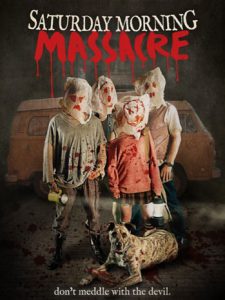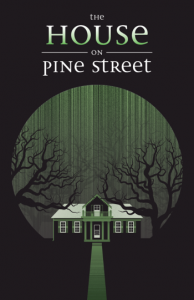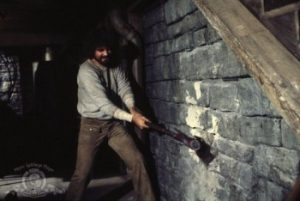Real Life Horror: The Sacrament (2013) Review
On November 18th, 1978 over 900 people were murdered under the guidance of Jim Jones. 35 years later, director Ti West shows us a similar descent into the clutches of a cult.
Jim Jones was an atheist and communist during a period of history in which his beliefs could have had him imprisoned or worse. He wanted to express his Marxist rhetoric and inform people of this ideology, so he became a religious figurehead. He used religion to steer people away from the dependency of religion itself.
Early in Jones’ career as a “preacher” he was barred from the Methodist church for allowing African-Americans into his congregation. This event, coupled with Jones witnessing the fortune that could be made with faith healing, lead to him opening his own church. The People’s Temple Christian Church Full Gospel was envisioned as an inter-racial mission. This began his crusade of desegregation. Prior to his move to Guyana, Jim Jones was described by many as a humanitarian. During his travels he integrated churches, hospitals, restaurants, theaters, and police departments. In 1961 he and his wife were the first white couple in Indiana to adopt a black child. He continued to spread his proletariat supporting gospel and amassing new members everywhere he went. After learning about the potential of a nuclear holocaust he told his members that by 1967 the world would be completely destroyed. He used this fear to move them to northern California, believing they could create a “socialist Eden.”
The People’s Temple stayed in Northern California for a while then moved again to San Francisco where Jones was told he could accomplish more in the fight for human rights. It was in San Francisco that Harvey Milk became a supporter of him. Jones was likened to Martin Luther King Jr. and J.F.K. While his popularity grew so did the amount of reporters investigating the temple.
When members of his congregation left him, he described it as ‘defecting out.’ These members posed the largest threat to Jones, they offered a true glimpse beyond the facade of piousness that he manufactured. There came to light allegations of physical, psychological, and sexual abuse from the defected, but before any formal charges were made Jones and his followers fled the country.
Jones named his socialist paradise Jonestown and from the summer of 1977 to that tragic day in 1978 over 900 people worked together as a community. They grew crops, built homes, and they took care of each others children. Within this utopia stories have emerged about Eden’s underbelly. One particularly nasty tidbit claims Jones would sodomize any young man who believed he may be a homosexual, in order to cure them of their desire. The same story also states that it disgusted Jones, but he thought it had to be done. It must not have been too horrible for him since he’d been arrested for it in San Francisco a few years prior.
The 1978 conflict began as a custody battle. Tim and Grace Stoen had a child while they were members of the temple. The child was possibly conceived when Tim asked Jones to sleep with his wife. Due to this, Jones believed it to be only his son. When Grace defected Tim took their child to Jonestown and eventually when he defected Jones kept the child at the compound. Back in the states, Tim sought legal council to get his son back. Eventually this abduction piqued the interest of California congressman Leo Ryan. On November 18th Ryan, along with a NBC TV crew, went to investigate Jonestown. When the congressman was leaving a shootout began and resulted in the death of Ryan and members of the news crew.
Jones knew the day would come when an outside party would destroy the society he created. Instead of letting his followers flee, he convinced them that the military would be there soon and they would all be slaughtered. He told them they should end their lives quietly and peacefully rather than be gunned down in a massacre. With sleeping pills, cyanide, and a fruity drink they all perished that afternoon.
The Sacrament tells a similar story story of Jones and his followers, through the eyes of a journalist and his cameraman. Ti West has compacted the history of Jonestown and modernized it into an hour and a half account of the final day. He draws us in using a faux documentary style and utilizes this subjective journalistic approach. Sam (AJ Bowen) and Jake (Joe Swanberg) are reporters for Vice magazine. Their friend Patrick (Kentucker Audley) a fashion photographer tells them about how his sister Caroline (Amy Seimetz) has been missing and she’s finally sent him a letter ambiguously detailing a “clean living” community she has become part of. Sam and Jake decide to go with Patrick to find his sister.
West is able to balance our interest in the community. He shows how they work together and how “Father” (Gene Jones) has given their lives meaning. The characters, along with the audience teeter back and forth on their feelings about Eden Parish. On one level the people have found happiness but at the same time they are members of a cult. In real life and in The Sacrament it is difficult to believe a man could be so charismatic as to control large groups of people through a message of hope rather than hate, that is until we meet “father.” When Sam is granted an interview with him we see how the community came together. Through charm, intrigue, and a little intimidation “Father” dodges all of Sam’s questions and makes the interview more about Sam and how he is the one brainwashed by Western Civilization. Once the interview is over, Sam and Jake discuss the merits of the community. They come to the conclusion that Eden Parish works, maybe not for them, but it seems to fulfill the lives of the people who gave up everything to live there.
West has said that with The Sacrament he did not want to pass judgment on any of the members. He is right, we feel for them and understand them. We even see the good in “father” at first. As far as West’s filmography, The Sacrament feels completely different from his other works. There are no lingering shots and no supernatural entities, instead the horror that encapsulates this film is based on humanity and the horrors that we can do to one another. Like West’s other films there is a slow burn effect, but it is not forced, instead we spend time learning about the community and the control “father” has over them before the climax. Even if you knew nothing of Jonestown except for “drinking the Kool-Aid,” The Sacraments is still palpable. Ti West shows the psychological effects of the corrosive nature that too much power can yield.
The Sacrament is planted firmly in the next wave horror community. Ironically, Ti West and his peers have formed their own filmmaking cult. Through auteurism and substance-over-style filmmaking these new directors, producers, writers, and actors are changing the entire horror industry.
Have you seen The Sacrament? Let us know how you felt about it. I think that it will be one of those films that people either love or hate.




![Love in the Time of Monsters [Review]](https://www.horror-movies.ca/wp-content/uploads/2021/04/Love-in-the-Time-of-Monsters-Poster-350x531-1-198x300.jpg)
![Fantasia 2018: Puppet Master: The Littlest Reich [Review]](https://www.horror-movies.ca/wp-content/uploads/2021/04/PMLR12-UDO-KIER-350x216-1-300x185.jpg)
![[Horror Short Review] Cindy Maples’ Random](https://www.horror-movies.ca/wp-content/uploads/2021/04/Random-Poster-350x524-1-200x300.jpg)







